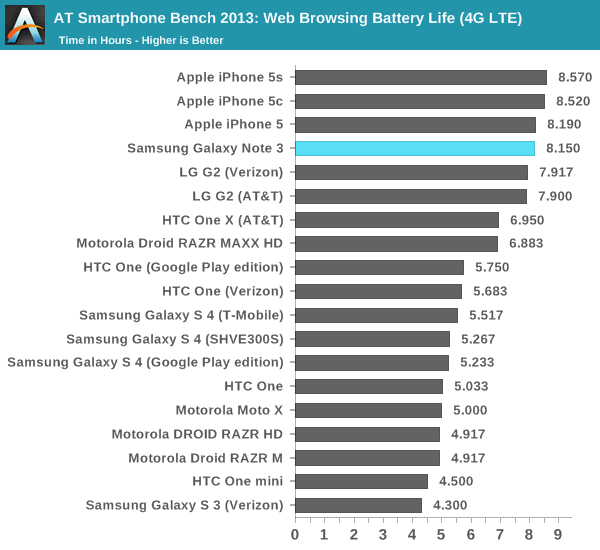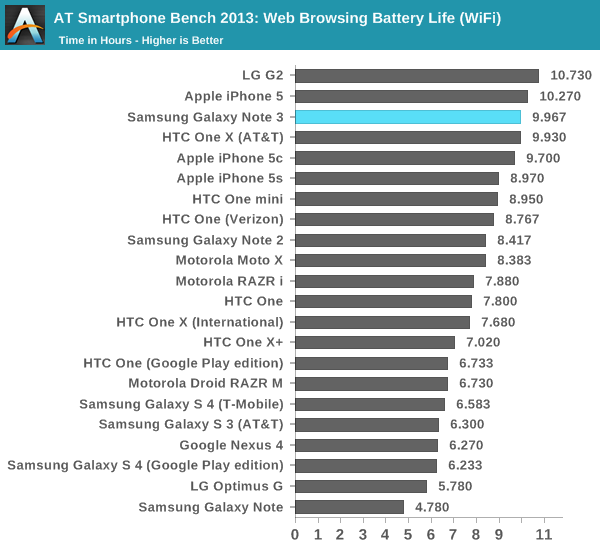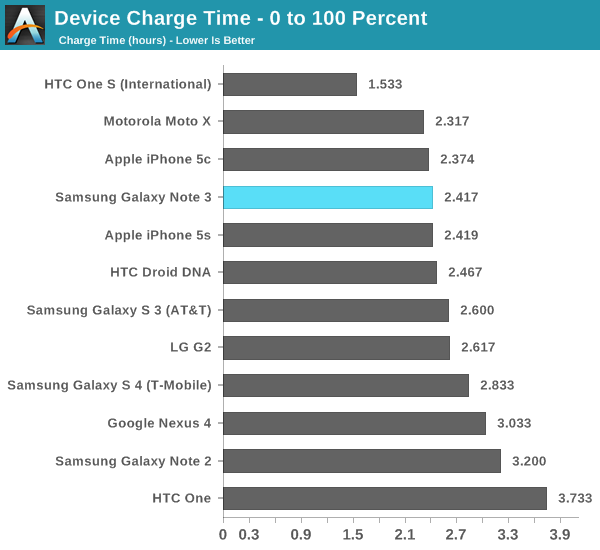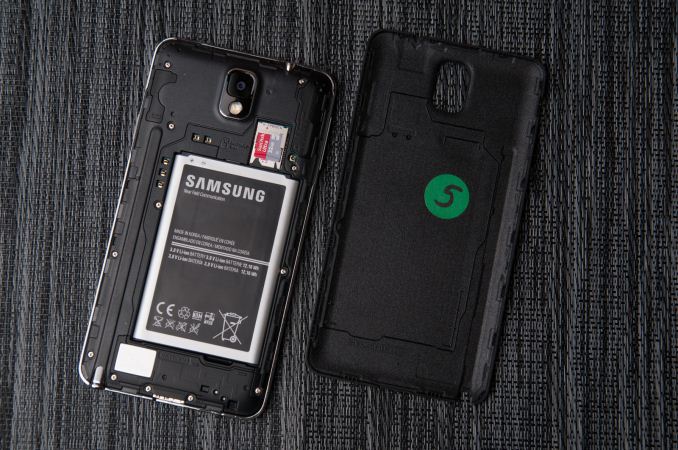Samsung Galaxy Note 3 Review
by Brian Klug on October 1, 2013 9:00 AM EST- Posted in
- Smartphones
- Samsung
- Mobile
- Android 4.3
- galaxy note 3
Battery Life
Battery life remains probably the single largest differentiator for devices lately, and of huge concern to enthusiasts and normal shoppers alike. We’ve already caught a glimpse of how well 8974 fares from a power perspective inside the LG G2, a device that posted some seriously impressive battery numbers. The Note 3 we’re looking at is also 8974 based since it’s a T-Mobile model, and thus we expect the same kind of battery life.
With this generation of Note, battery gets even larger. The Note started with a then quite large 9.25 watt hour battery, then Note 2 moved to 11.78 watt hours, and Note 3 now moves to a very large 12.16 watt hour battery with of course the newest 3.8V chemistry and all that comes along with it. Display size goes up, but those power gains are offset in other places.
After we talked about the panel self refresh features in the G2 a few people reached out and let me know that this feature has been shipping for a while in some phones, and it’s easy to check for. If we look under the display subsystem we can see that the same MIPI_CMD_PANEL type 9 is used, which refers to this type of interface.
Qualcomm HWC state: MDPVersion=500 DisplayPanel=9
define MIPI_CMD_PANEL ‘9’
Our battery life tests are unchanged and consist of a set of popular webpages that are loaded on a schedule with the display set to exactly 200 nits and repeated until the battery runs out and the device dies on both WiFi and cellular data connections. In this case that means T-Mobile LTE which is 10 MHz FDD in my market, I haven’t had a chance to run the Note 3 on HSPA+ yet, or complete the call test (which is starting to get ridiculous, and probably breaks 24 hours in the case of the Note 3).

On LTE the Note 3 does very well, coming just shy of the pack of iPhones, at just over 8 hours. Interestingly enough it’s just north of the G2s as well, which do have a smaller battery but also smaller display. The Note 3 also is the first device to ship with Qualcomm’s QFE1100 envelope tracker solution from the RF360 front end portfolio, which lowers power consumption by up to 20 percent and heat dissipation by up to 30 percent by allowing the power amplifiers to follow the desired output waveform. There’s more on that later in the cellular section.

On WiFi the Note 3 does better by 22 percent, but not the kind of huge jump I’m used to seeing between cellular and WiFi testing. This tells me the Note 3 battery life is really gated by the display, which is almost always the largest consumer of power in a device. That said the Note 3 does very well all things considered, especially in comparison to the APQ8064 (Fusion 3) phones which came before it, like SGS4. New silicon and new process inside MSM8974 definitely helps move battery life forward here with the race to sleep game.
Charging is an interesting story on the Note 3, but primarily because of what doesn’t change. The Note 3 continues to use Samsung’s tablet charging specification and charger, which has 2 amps of maximum output. The Note 3 draws 2 amps over a considerable amount of the charging curve, like other Samsung devices (in the linear part of the charge curve). USB 3.0 doesn’t change things up here quite yet with the new supported charge voltages that are coming eventually with the power delivery specification.

The Note 3 does charge faster overall compared to the SGS4 however thanks in part to the new PMIC (PM8941) which is part of the overall 8974 platform story.











302 Comments
View All Comments
identity - Tuesday, October 1, 2013 - link
Anandtech said every Android device does it but keep ignoring that ok?Chillin1248 - Tuesday, October 1, 2013 - link
And because several (he never said all) manufacturers are cheating, the rest have to suffer?At the very least he could be fair and run the battery tests with the browser renamed as one of the "boost" apps. Let's see how Samsung (and others) will like how their results show up then compared to the manufacturers that aren't doing such blatant cheating.
identity - Tuesday, October 1, 2013 - link
Samsung still beat the G2 without the boost according to Arstechnica anyways. I doubt people will care if the HTC One uses the same boost(which it does and nobody cares) because it's not a threat to Apple and it's not Samsung,Chillin1248 - Tuesday, October 1, 2013 - link
But barely, not with the huge margin that we currently see in Anand's benchmarks.Anand, for the sake of your site's integrity; I plead with you to take down the current benchmarks and re-run them with ARSTechnica's workaround. Either that, or run the WiFi battery benchmarks while renaming the browser to one of the "boost" applications. That way, it will be a fair comparison of the Device's User Experience.
Squuiid - Tuesday, October 1, 2013 - link
Does that make it ok then? Benchmarks are used to compare cross platform devices. Pretty sure Apple and Microsoft don't inflate their benchmarks.Would you condone drug taking in sports if everyone doped?
stajcer - Tuesday, October 1, 2013 - link
I too am disappointed in Anandtech's coverage of this issue. I think that this is usually one of the best written and most in depth hardware review sites out there, but to (seemingly) gloss over this issue with one or two lines in the review and then state that the Note 3 has the fastest s800 chipset is just absolutely false. You know that its cheating, and you mention it in the review, but then coming to the conclusion that this is the 'fastest android device' based on benchmark info that you know to be misleading is a huge error IMO.Just because other companies do it does not excuse this behaviour. unless more people are made aware that they're cheating (one or two lines buried in the middle of a review dont matter) they'll keep doing it. The only way to end it is to blatantly call out the manufacturers that are doing it. Which means that you cant conclude something is 'the fastest' if you know that the benchmarks are run in a way on the device that it cant be replicated by the end user - end of story.
Klug4Pres - Wednesday, October 2, 2013 - link
I too am disappointed in the way Anandtech is choosing to deal with benchmark cheating. Either find a way to circumvent the cheating, or do not post benchmark results. It really is that simple.doobydoo - Saturday, October 19, 2013 - link
I completely agree. If you know a phone is boosting a benchmark - the point on the graph should be labelled as 'artificially boosted' or words to that effect. Then a non-boosted benchmark should be run.2disbetter - Tuesday, October 1, 2013 - link
I don't know... I'm not that bothered by Samsung's attempt to get higher scores. Their "cheating" as it were, is simply overclocking the chipset. The chipset IS in fact performing as the benchmark indicates. It's misleading, sure, but not really lying. We have long since surpassed the need for hardware speed improvements on any mobile OS, so bickering about performance seems kind of redundant. None of the premier phones today can actually really use their horsepower so ultimately what does it really matter?xype - Wednesday, October 2, 2013 - link
It matters because it makes the damn benchmarks useless. What help are performance graphs if they have to come with an asterisk and "Well, not that any performance difference seen herr matters anyway, cause we're too fucking lazy to put in the work and do a proper comparison."